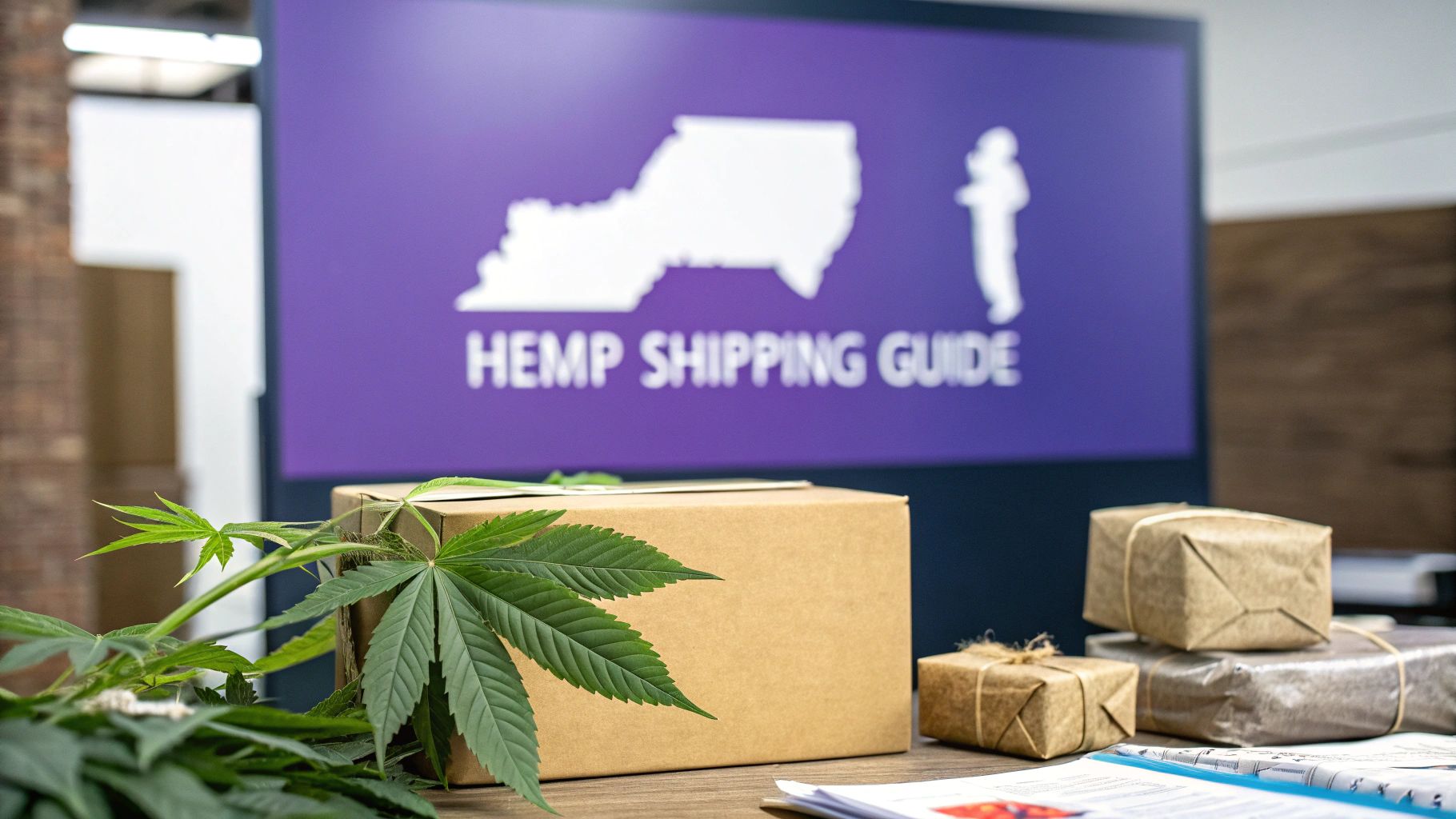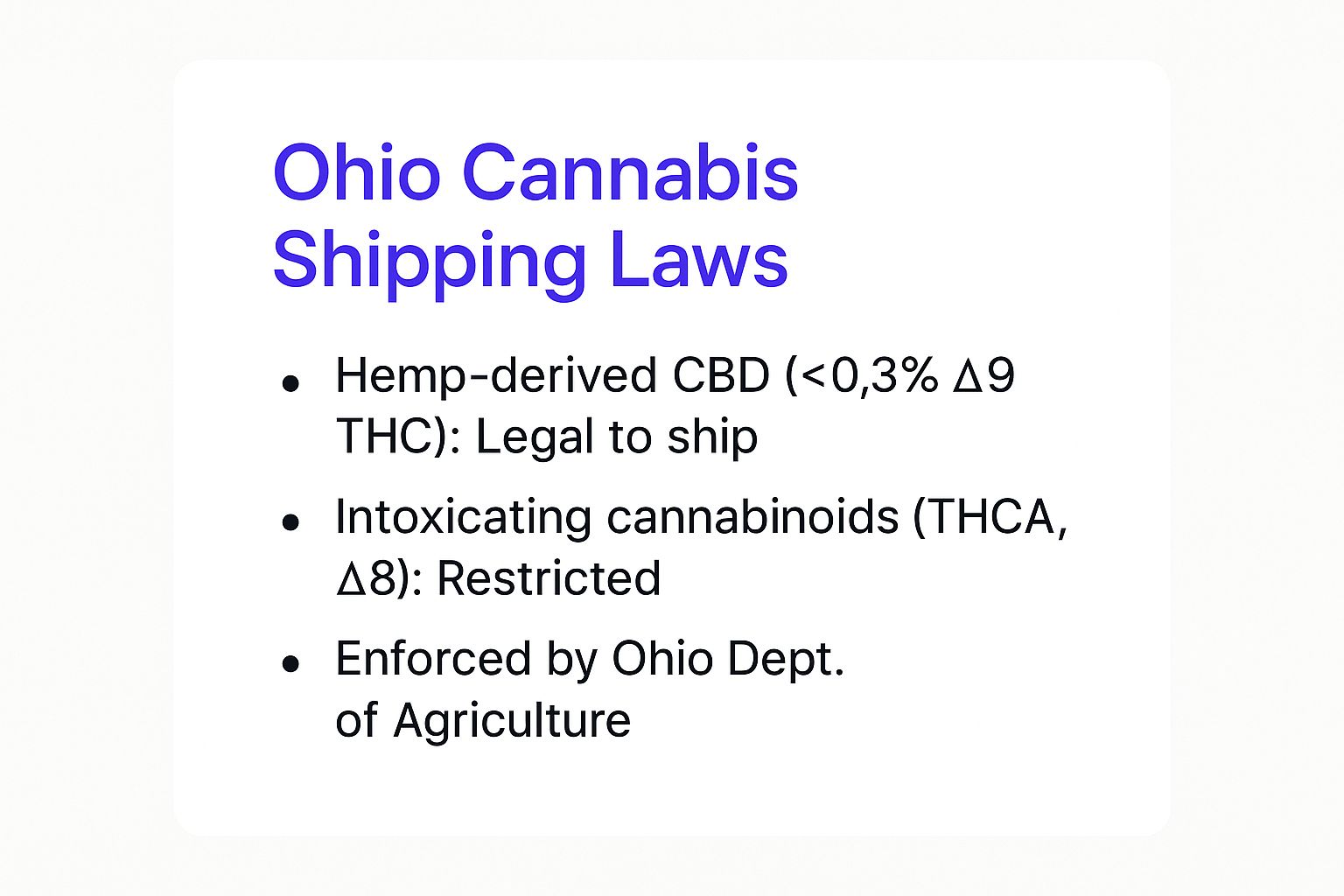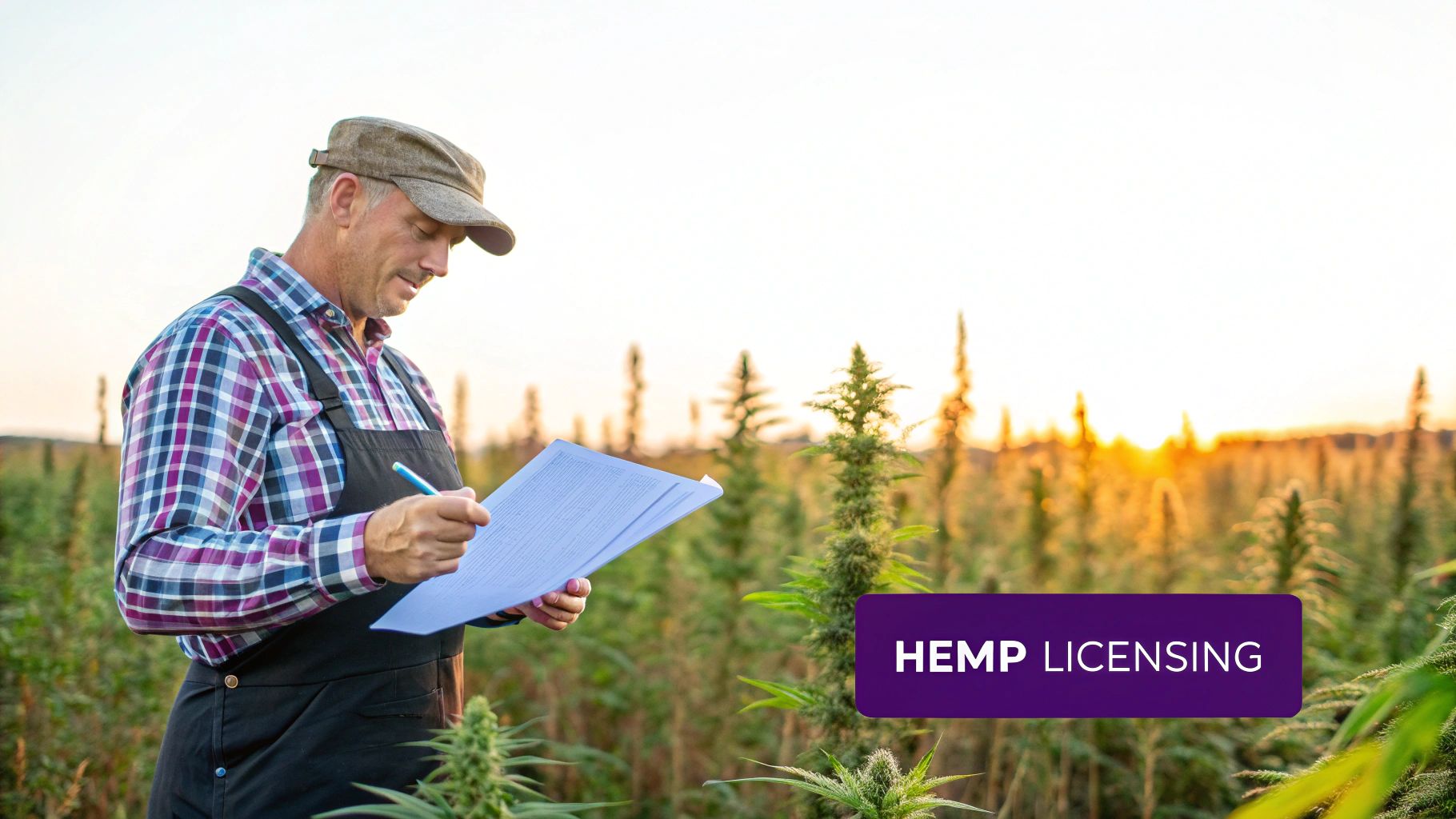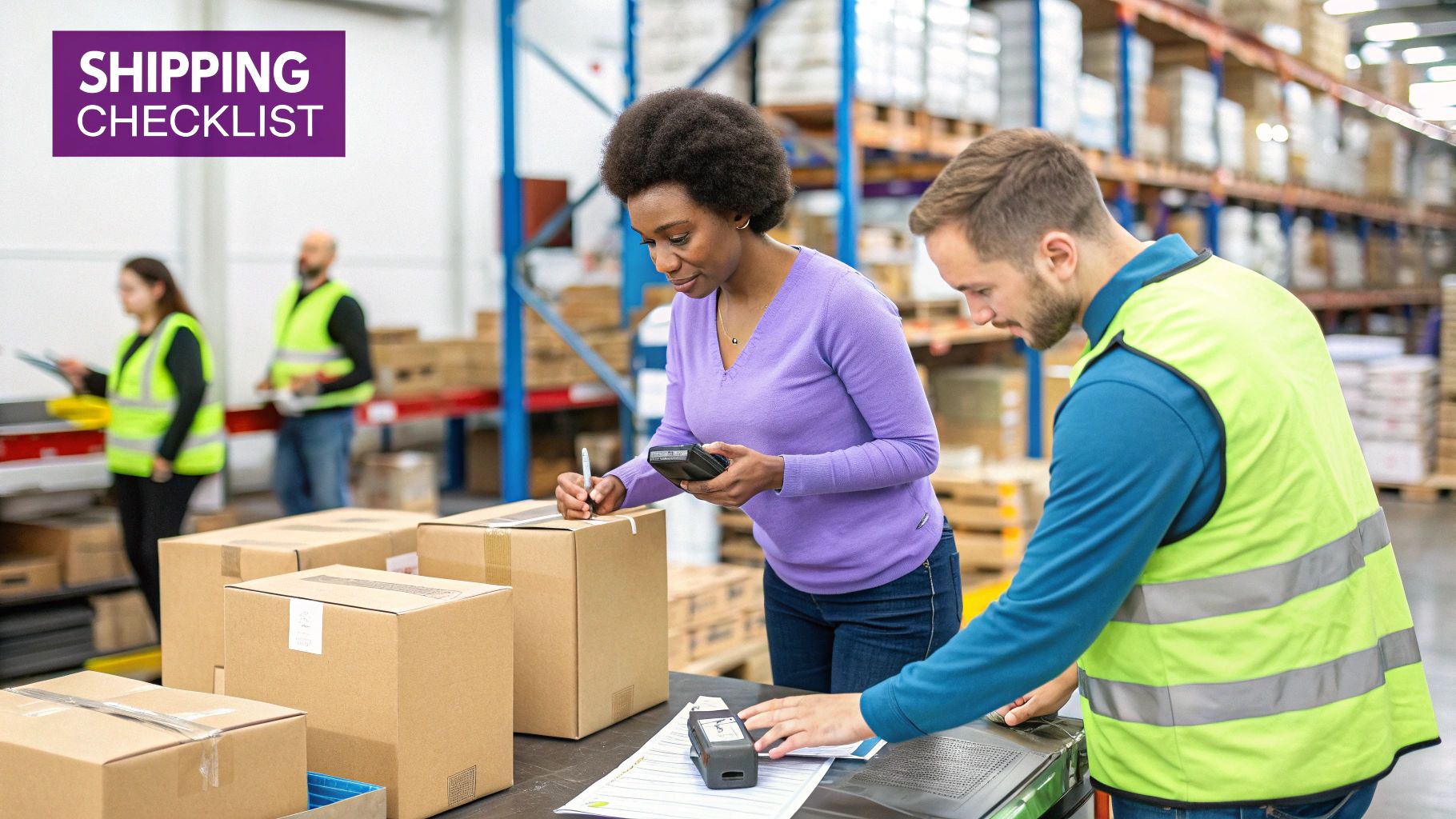
CBD/Hemp/THCA Shipping Laws Ohio — Complete Guide
Learn all about CBD/Hemp/THCA Shipping Laws Ohio. Our comprehensive guide covers licensing, compliance, and regulations to keep your shipments legal and secure.
Cody Y.
Updated on Oct 15, 2025
Yes, you can legally ship some CBD and hemp products to Ohio, but there's a huge catch: they absolutely must contain less than 0.3% Delta-9 THC. When it comes to intoxicating cannabinoids like THCA, however, the situation gets much more complicated—and risky. State regulators are actively cracking down on any product that can get a user high.
A Guide to Ohio's Cannabis Shipping Laws
Trying to understand Ohio's CBD, hemp, and THCA shipping laws can feel like trying to hit a moving target. On one hand, the state follows federal law, which generally allows shipping of non-intoxicating, hemp-derived products. But on the other hand, the explosive growth of "intoxicating hemp" has forced regulators to act fast, creating a high-stakes game for e-commerce stores.
The main players here are the Ohio Department of Agriculture (ODA) and the state legislature. Their job is to enforce the rules and protect consumers, which means they spend a lot of time drawing a hard line between harmless CBD and psychoactive compounds that exist in a legal gray area.
The Shifting Regulatory Landscape
These rules are anything but set in stone. In a major move driven by public health concerns, Governor Mike DeWine announced a 90-day emergency ban on intoxicating hemp products, which went into effect on October 14, 2025. This order forced retailers to pull products with elevated Delta-8 and Delta-9 THC levels off their shelves immediately, sending a clear message about where the state stands.
This infographic breaks down the current shipping rules in Ohio at a glance.

As you can see, the visualization clearly separates the compliant products from the restricted ones, showing just how critical the ODA's role is in enforcing these distinctions.
For a quick reference, here’s a breakdown of how different cannabis products are treated in Ohio.
Ohio Cannabis Product Shipping Status
| Product Type | Legal Status in Ohio | General Shipping Legality | Key Restriction |
|---|---|---|---|
| CBD (Hemp-Derived) | Legal | Permitted | Must contain less than 0.3% Delta-9 THC. |
| Hemp Flower | Legal | Permitted | Must meet the 0.3% Delta-9 THC threshold. |
| THCA Flower | Illegal (Considered Marijuana) | Prohibited | Total potential THC content exceeds legal limits. |
| Delta-8 THC | Illegal (Intoxicating Hemp) | Prohibited | Subject to emergency bans and regulatory crackdown. |
| Recreational Marijuana | Legal for Adult Use | Prohibited | Cannot be shipped; must be purchased at licensed dispensaries. |
| Medical Marijuana | Legal for Patients | Prohibited | Cannot be shipped; must be purchased at licensed dispensaries. |
This table makes it clear that while some products are fine to ship, others are completely off-limits, regardless of their origin.
The most important thing for any online seller to remember is this: just because a product comes from hemp doesn't automatically make it legal to ship. What regulators really care about is the total potential THC content.
Getting a handle on these details is crucial for staying compliant. Ohio's rules are just one piece of a much larger, more complex national puzzle. For a wider view, check out our complete guide to CBD shipping laws by state. And if you're dealing with larger shipments, understanding the regulations around freight shipping into Ohio can provide more context for staying on the right side of the law.
Understanding Ohio's Hemp Licensing Program
To ship CBD and hemp products legally in Ohio, you have to play by the state's rules. Think of it as a tightly controlled "farm-to-mailbox" journey where every single step needs a license to back it up. The Ohio Department of Agriculture (ODA) is the gatekeeper here, making sure any product hitting the market—and eventually your customer's doorstep—comes from a legit, compliant source.
This program is the absolute foundation for staying on the right side of CBD/Hemp/THCA shipping laws in Ohio. It creates a clear paper trail, starting with licensed cultivators growing the hemp and ending with licensed processors turning it into the products you sell. Each license is proof that the business follows strict state and federal rules, with the most critical one being the 0.3% Delta-9 THC limit. Without this system, the market would be the Wild West.

Cultivator and Processor Licenses
The ODA doesn't use a one-size-fits-all approach. They've set up specific licenses for different jobs in the hemp supply chain. These aren't just pieces of paper; they're a commitment to safety, quality, and legality.
- Cultivator License: This is your ticket to legally grow hemp in Ohio. It comes with an application fee and a per-location fee, making sure every single grow site is on the ODA's radar.
- Processor License: This license is for businesses that take raw hemp and turn it into oils, tinctures, edibles, or other consumer goods. The fees are tiered based on what kind of processing you’re doing.
Ohio’s hemp scene is booming. The number of licensed processors shot up from just 34 in January 2025 to 72 by August 2025. A cultivator license costs $100 to apply plus $500 per growing location for a three-year permit. Processor licenses also have a $100 application fee, but the license itself can range from $500 for simple fiber processing up to $3,000 for floral processing. You can dig into more details on Ohio's legal landscape and find specific licensing data over at Cannovia.
A crucial detail in Ohio law: while growers and processors need licenses, retailers selling compliant, non-intoxicating CBD products currently do not need a special state-issued retail license.
This is a game-changer for e-commerce sellers. It means that as long as your products come from a licensed Ohio processor and you have the COA to prove they're compliant, you can ship to Ohio customers without needing your own special license from the state.
This puts all the pressure on your supplier's credentials. For any online store, verifying that your partners hold the right Ohio licenses isn't just a good idea—it's a non-negotiable step to keep your shipments legal and safe from seizure.
Navigating the Intoxicating Hemp Gray Area
<iframe width="100%" style="aspect-ratio: 16 / 9;" src="https://www.youtube.com/embed/jmX5B7wLXcc" frameborder="0" allow="autoplay; encrypted-media" allowfullscreen></iframe>While non-intoxicating CBD has a relatively clear legal path, the world of hemp compliance gets far more complicated with the rise of so-called "intoxicating hemp" products. This is where things get tricky.
This category includes compounds like Delta-8 THC and, more importantly, Tetrahydrocannabinolic Acid (THCA). For e-commerce businesses, understanding CBD/Hemp/THCA shipping laws in Ohio feels like walking a tightrope.
The whole issue stems from a legal loophole. Products loaded with THCA can be sourced from federally legal hemp, meaning they technically meet the <0.3% Delta-9 THC standard when they're tested and sold. However, when a customer heats that THCA by smoking, vaping, or cooking, a chemical process called decarboxylation kicks in and converts it into psychoactive Delta-9 THC.
This creates a massive regulatory headache. A product that's legally "hemp" sitting on the shelf can become an intoxicating substance once it's in the customer's hands. For online retailers, simply seeing a "hemp" label on a product is no longer a guarantee that it's legal to ship in the eyes of Ohio regulators.
Ohio's Crackdown on Psychoactive Hemp
Ohio officials are moving quickly to close this gray-area loophole. Recent legislative efforts show a major shift toward prioritizing consumer safety and bringing clarity to the market. Spurred by a spike in adverse health events and ER visits tied to intoxicating hemp, new proposals aim to restrict their sale to licensed dispensaries only.
This regulatory change means thousands of convenience stores, vape shops, and CBD retailers might soon have to either pull these popular products from their shelves or go through the process of getting a dispensary license.
The key takeaway for any business is that Ohio no longer distinguishes products based on their origin (hemp vs. marijuana). Instead, the focus is on their potential for intoxication. If a product can get a user high, it's under intense regulatory scrutiny.
How to Verify Product Compliance
To stay out of trouble and avoid seized products or legal penalties, businesses have to look past the marketing and dig into the product's chemical makeup. The only way to do this reliably is by carefully reading the Certificate of Analysis (COA) that should come with every single product batch.
A COA is a lab report that breaks down a product’s cannabinoid profile. When you're checking one for Ohio compliance, you need to find two key numbers:
- Delta-9 THC: This value must be below 0.3%.
- Total THC: This is the number that really matters now. It's calculated by adding the Delta-9 THC content to the potential THC that can be converted from THCA (Total THC = Δ9THC + (THCA * 0.877)).
If the "Total THC" on that COA is over the legal limit, the product is considered marijuana under Ohio law and is illegal to ship through standard carriers. For a deeper dive into the general rules, check out our detailed guide on hemp shipping rules and restrictions. Meticulously checking every COA is your best defense against a compliance disaster.
Your Actionable Shipping Compliance Checklist

Knowing the rules for shipping CBD, hemp, and THCA in Ohio is one thing. Putting them into practice consistently is another challenge entirely. To protect your business from seized packages, fines, or worse, you need a repeatable process for every single order that leaves your warehouse.
Think of this as your pre-flight checklist. Each step is a critical safety check that gives your shipment the best possible chance of arriving without a hitch. Skipping even one of these could ground your entire operation.
Documentation and Packaging Essentials
The number one reason a legal hemp shipment gets flagged? Missing paperwork. It's that simple. Your package must contain clear, immediate proof of compliance that any law enforcement officer or carrier employee can quickly verify.
- Include a Certificate of Analysis (COA): This is non-negotiable. Every single shipment must have a copy of the product’s COA, proving its Delta-9 THC concentration is below the 0.3% federal limit.
- Add a Notice to Law Enforcement: You should also include a printed letter that clearly states the package contains legal hemp products compliant with the 2018 Farm Bill and Ohio state law. This small step can prevent huge headaches.
- Use Discreet Packaging: Your outer box should be plain and unmarked. Avoid any branding, logos, or text that even hints at the contents being cannabis-related. This helps prevent unnecessary scrutiny and potential theft.
Meticulous record-keeping is your best defense. Keep digital and physical copies of all COAs, supplier licenses, and shipping manifests. If a shipment is ever questioned, this paper trail is your proof of due diligence.
Carrier Policies and Compliance
Not all shipping carriers see hemp the same way. Choosing the right partner—and following their rules to the letter—is a massive piece of the compliance puzzle. Each one has its own specific set of requirements you absolutely must follow.
Here’s a quick look at where the major carriers generally stand on shipping hemp products.
Shipping Carrier Hemp Policies Comparison
Choosing a shipping carrier isn't just about price and speed; it's about understanding their specific rules for hemp-derived products. Each major carrier has its own policies, and failing to follow them can result in refused or seized shipments, even if your product is perfectly legal. Below is a high-level comparison to help you navigate their requirements.
| Carrier | Requires COA | Specific Packaging Rules | Stated Policy on Intoxicating Hemp |
|---|---|---|---|
| USPS | Yes, must be available upon request. | Requires the mailer to retain compliance records for 2 years. | Prohibits shipping products illegal under federal or state law. |
| UPS | Yes, may be required. | Must be from a licensed grower/producer and follow all laws. | Will not ship products considered illegal at any government level. |
| FedEx | Yes, documentation must be available. | Prohibits shipping marijuana, but allows legal hemp. | Will not ship any product that violates local, state, or federal laws. |
Ultimately, it doesn't matter which carrier you choose—the responsibility for compliance lands squarely on you, the shipper. And remember, compliance goes beyond the box. You also need to follow FDA regulations by avoiding unproven health claims in your marketing and implementing solid age verification at checkout to prevent sales to minors.
Automating Compliance for Ohio Shipments

This screenshot shows how an app like ShipRestrict lets a business build specific shipping rules, blocking certain products from being sent to restricted states like Ohio.
Manually keeping up with the constant changes to CBD, hemp, and THCA shipping laws in Ohio is a full-time job. For an online store, trying to do this by hand isn't just a headache—it’s a surefire way to make a costly mistake. One accidental shipment of THCA flower can mean seized packages, furious customers, and a legal mess you don't want.
A modern, automated system is the only realistic way to stay on top of it all. Instead of juggling spreadsheets or forcing your team to double-check every single order, you can use software that automatically enforces your shipping rules right at checkout. It becomes a digital gatekeeper for your store.
How Automated Shipping Restrictions Work
Think of shipping restriction software as a smart bouncer for your checkout page. It plugs directly into your e-commerce platform, like Shopify or WooCommerce, and instantly checks every customer’s cart against the rules you’ve set.
When a shopper in Ohio tries to purchase a product you’ve flagged—like THCA flower—the system stops the sale cold, before they can even pull out their credit card. It literally prevents an illegal order from ever being placed. To handle these moving parts, many businesses turn to proven e-commerce shipping solutions to put their compliance on autopilot.
The level of control you get is incredibly precise. You can set up rules to:
- Block specific products from being shipped to an entire state.
- Restrict items based on a city or even down to the ZIP code.
- Allow some products (like CBD oil) while blocking others (like Delta-8 gummies) going to the same place.
For instance, you could create a rule that lets all CBD tinctures ship to Ohio but automatically blocks any cart containing THCA pre-rolls headed to an Ohio address.
The real power of automation is in managing risk. By stopping a non-compliant order before it's even placed, you wipe out the chance of human error and avoid the serious fallout from shipping a regulated product where it doesn’t belong.
Freeing Up Resources to Grow Your Business
Time is your most valuable asset. Spending it on endless legal research, training staff on new regulations, and manually reviewing orders is a drain. It pulls you away from what actually grows your business: marketing, product development, and customer service. Automation takes these repetitive, high-stakes tasks off your plate and gives them to a system that never gets tired.
This strategy works no matter what platform you're on. For example, understanding how automated shipping compliance for WooCommerce stores works provides a clear blueprint for setting up these critical safeguards. By letting software handle the enforcement of Ohio’s tricky shipping laws, you can focus on scaling your business with confidence, knowing that a crucial layer of compliance is always working in the background.
What's Next for Ohio Cannabis Shipping Rules?
If there's one constant in the world of shipping CBD, hemp, and THCA in Ohio, it’s change. Staying compliant tomorrow means you have to get a read on where the rules are heading today. For any e-commerce business in this space, looking ahead isn’t just smart—it’s a survival tactic.
The biggest shift on the horizon is the aggressive push to regulate intoxicating hemp products like THCA and Delta-8. Ohio, along with many other states, is finally moving to close the legal loophole that let these psychoactive compounds fly under the radar, outside the licensed marijuana market. This is a clear signal that these products are on a fast track to being restricted exclusively to the adult-use dispensary system.
Keep an Eye on Federal Changes
State laws don't operate in a bubble. A few key developments at the federal level could send shockwaves through Ohio's regulations, forcing you to pivot your business model almost overnight. You’ll want to watch two things very closely:
- The Farm Bill Reauthorization: Any tweaks to the federal definition of "hemp," especially around total THC calculations, could instantly change which products are legal to ship anywhere in the country, including Ohio.
- DEA Cannabis Rescheduling: If cannabis gets moved from Schedule I to a lower schedule, it could completely alter federal enforcement priorities. That, in turn, would heavily influence how Ohio decides to handle both hemp and marijuana.
The bottom line is this: the market is being forced into two distinct lanes. You'll have non-intoxicating wellness products (like traditional CBD) on one side, and regulated, intoxicating products (marijuana and high-THC hemp) on the other. The businesses that start preparing for that split now are the ones that will still be around in a few years.
Ultimately, the future of CBD, Hemp, and THCA shipping laws in Ohio is pointing toward tighter controls and much clearer boundaries. You have to stay agile, keep a close watch on legislative updates, and build a compliance strategy that can handle a more regulated and clearly defined marketplace.
Ohio CBD & Hemp Shipping: Your Questions Answered
Trying to get a handle on CBD, hemp, and THCA shipping laws in Ohio can feel like wading through mud. Let's clear things up with straightforward answers to the questions we hear most often.
Can I Legally Mail THCA Products to a Customer in Ohio?
Honestly? Shipping THCA directly to a customer in Ohio is playing with fire. It's a high-risk move that we wouldn't recommend.
While THCA comes from legal hemp, regulators are zeroing in on its ability to convert into intoxicating Delta-9 THC when you heat it. They’re aggressively closing the legal gray area around what they call "intoxicating hemp," pushing these products into the state-licensed dispensary system. Mailing THCA to a residential address is a serious compliance gamble right now.
Do I Need a Special License to Ship CBD Products to Ohio?
No, you don't need a special Ohio-issued license just to ship federally compliant CBD products into the state. The magic number is less than 0.3% Delta-9 THC on a dry-weight basis. If your products meet that standard, you're generally in the clear.
But here's the catch: you absolutely must ensure your products come from a licensed processor. Every single shipment needs to be accompanied by its Certificate of Analysis (COA) to prove it's legal and show its exact cannabinoid content.
Key Takeaway: Ohio might not demand a specific shipping license for compliant CBD, but the burden of proof is entirely on you. Think of your supplier's license and the product's COA as your passport for every single order—don't ship without them.
What Happens If My Hemp Shipment Is Seized in Ohio?
If your shipment gets seized, law enforcement or the carrier will launch an investigation to determine if it's legal. This is the moment where your paperwork either saves you or sinks you.
With the right documentation—like a COA confirming the product is under the 0.3% Delta-9 THC limit and proof of your supplier's license—the situation can often be cleared up quickly.
Without that proof, the shipment will likely be considered contraband. That could mean losing your products, facing hefty fines, or even legal trouble. Meticulous, order-by-order documentation isn't just a good idea; it's non-negotiable.
Stop risking costly shipping mistakes. Ship Restrict automates compliance for your store, blocking restricted products at checkout based on state and local laws. Protect your business and streamline your operations by visiting https://shiprestrict.com to learn more.

Cody Yurk
Founder and Lead Developer of ShipRestrict, helping e-commerce businesses navigate complex shipping regulations for regulated products. Ecommerce store owner turned developer.